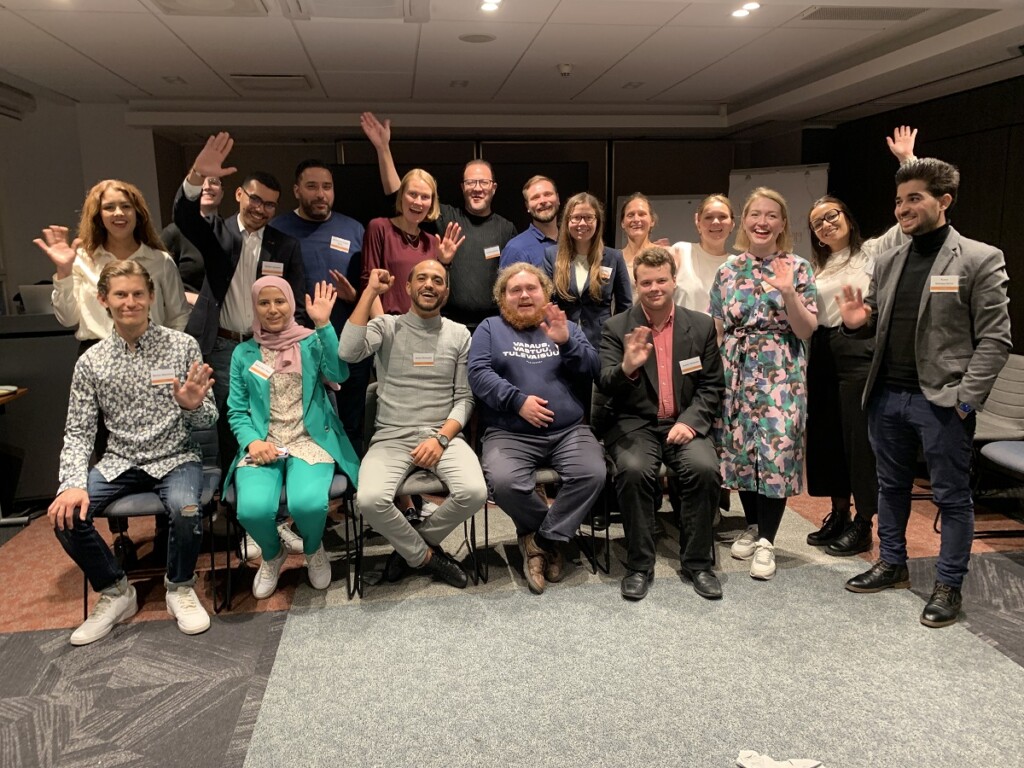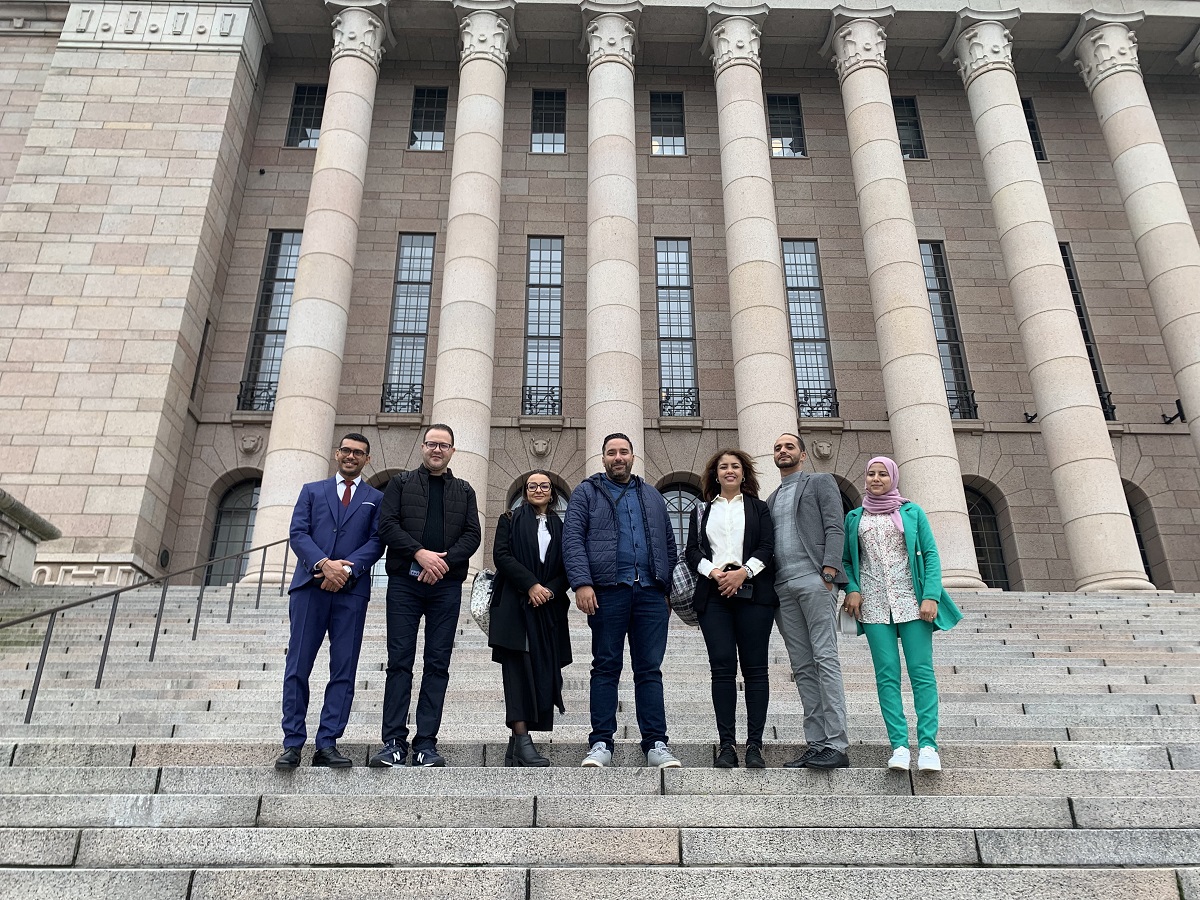Transparency of governance, coalition politics and youth participation were among the topics discussed on the Tunisian School of Politics alumni study visit to Finland.
An exceptionally warm September weather greeted a group of alumni of the Tunisian School of Politics (TSoP), a programme implemented by the Centre des Etudes Méditerranéennes et Internationales (CEMI) and supported by Demo Finland, as they arrived in Finland for a study visit. The purpose of the visit was to get to know Finland’s democratic system and to exchange experiences with Finnish political party actors. During the visit, the participants got to know the current political situation and history of Finland, coalition politics, the Finnish Parliament, co-operation of political women’s organisations and local governance. In addition, they met with Finnish political party representatives and had dialogue with members of political youth and student organisations. The group also visited the Ministry for Foreign Affairs and the Tunisian Embassy.
Especially in discussions with young Finnish politicians, the group learnt that democracy also has its challenges in Finland, and it must be constantly developed. This was a new realisation for many Tunisians, who know Finland as a strong democracy, with an established, well-functioning governance and multi-party system. In Tunisia, the era of democratic development has only lasted a little over a decade, and the situation has not looked very bright in the last couple of years. According to the latest democracy report of the V-Dem Institute, Tunisia is currently among the top autocratising countries.
Strengths of Finnish democracy
However, the participants of the study visit were optimist that Tunisia will return to the democratic path and that the voice of young people will be heard in decision-making. Young Tunisians still remember when there was no freedom before the Arab Spring, and they refuse to go back to that time. During the study visit, they got many ideas and insights that they want to use in their home country. In several meetings and discussions, they noticed the trust and transparency of Finnish society, and considered them to be central pillars of a functioning political system and one of the reasons why Finland has gained reputation as the happiest country in the world. “Transparency leads to happiness”, one of the participants summed up.
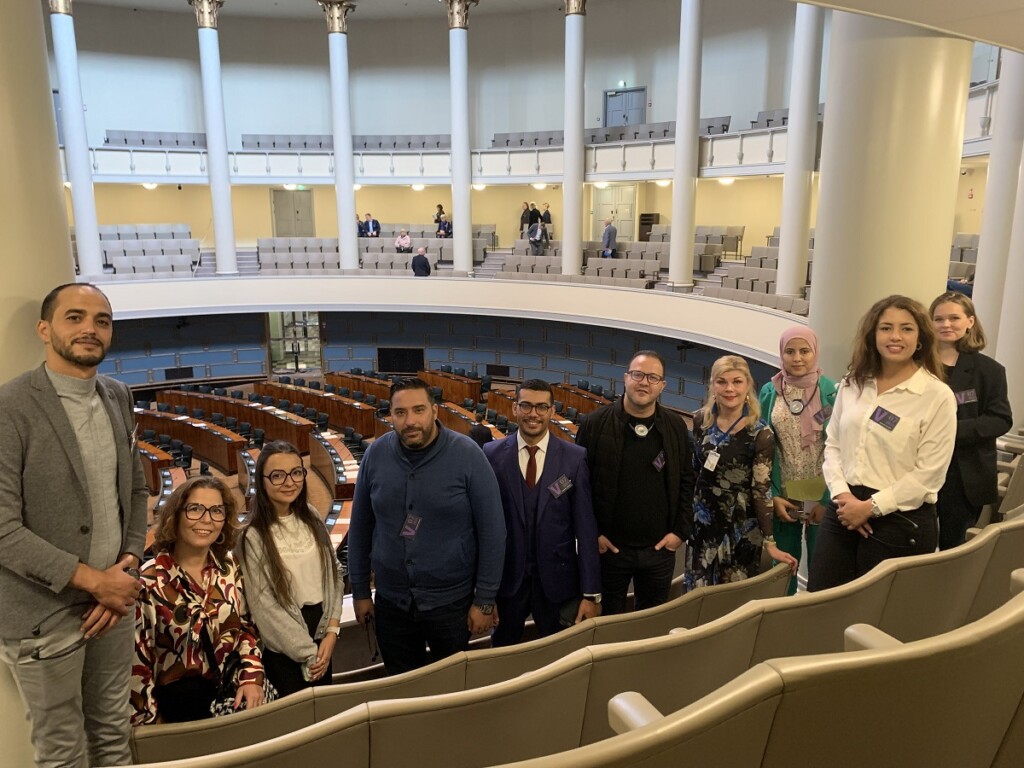
The comparatively high level of trust of Finns, both among citizens and in institutions and politicians, was interesting to the group, and they quickly noticed that transparency plays a significant role in achieving trust. For example, during the tour in the Parliament, the group was impressed by the openness and transparency as well as the easy access of citizens to the Parliament. In Tunisia, it is not possible for citizens to visit the Parliament due to the complicated process and bureaucracy required even though theoretically they have the right to free access. The transparency of Finnish decision-making is also strengthened by the online streaming of the Parliament’s plenary sessions and the publication of plenary sessions’ minutes, as well as the possibility for journalists to work freely in the Parliament.
The equality and low hierarchy of Finnish society was also noted by the participants. This was highlighted both in meetings with Tampere city councillors Vilma Järvisalo (Greens) and Liban Sheikh (Left Alliance) and in a visit to the office of the National Coalition Party, where party secretary Kristiina Kokko talked about the Finnish tradition of coalition governments. In addition to the warm welcome from the party office, the low hierarchy of Finns became concrete in the stairway of the party office where the group bumped into presidential candidate Alexander Stubb in running gear.
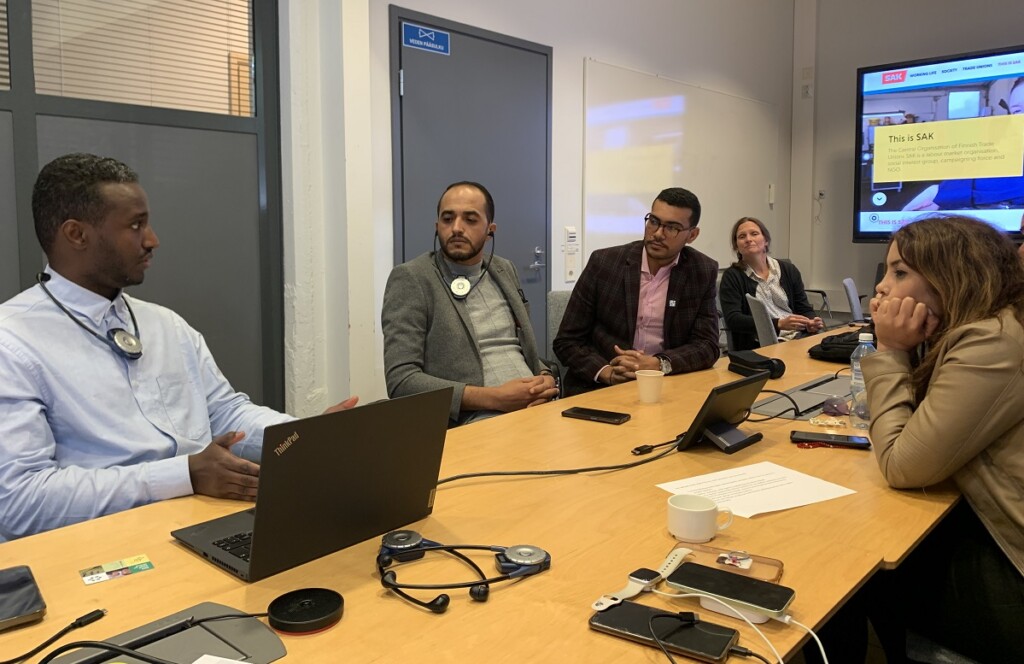
To Finns, many features of our society and political system can seem self-evident, which is why the international exchange of experiences as part of democracy support can be fruitful in many ways. In addition to being able to learn from the good practices of others, outsiders’ observations of our own practices can help us see what is worth cherishing and where our strengths lie.
For example, during lunch meeting with Vilma Järvisalo, the importance of programmatic political parties was discussed. It is not always self-evident that political parties have political programmes in countries where the multi-party system is new and where the political party field is very scattered and constantly changing. In Tunisia, the latest parliamentary elections were held within the framework of the new electoral law, which put political parties in a difficult position. The political parties could not nominate candidates for the elections, but only individuals without a political party list could run. In established multi-party democracies, the voters know what kind of policies the parties strive for as their values and programmes are widely known. Building political party programmes from scratch is not an easy task, which is why democracy support with political parties and peer support among political parties is important in new democracies.
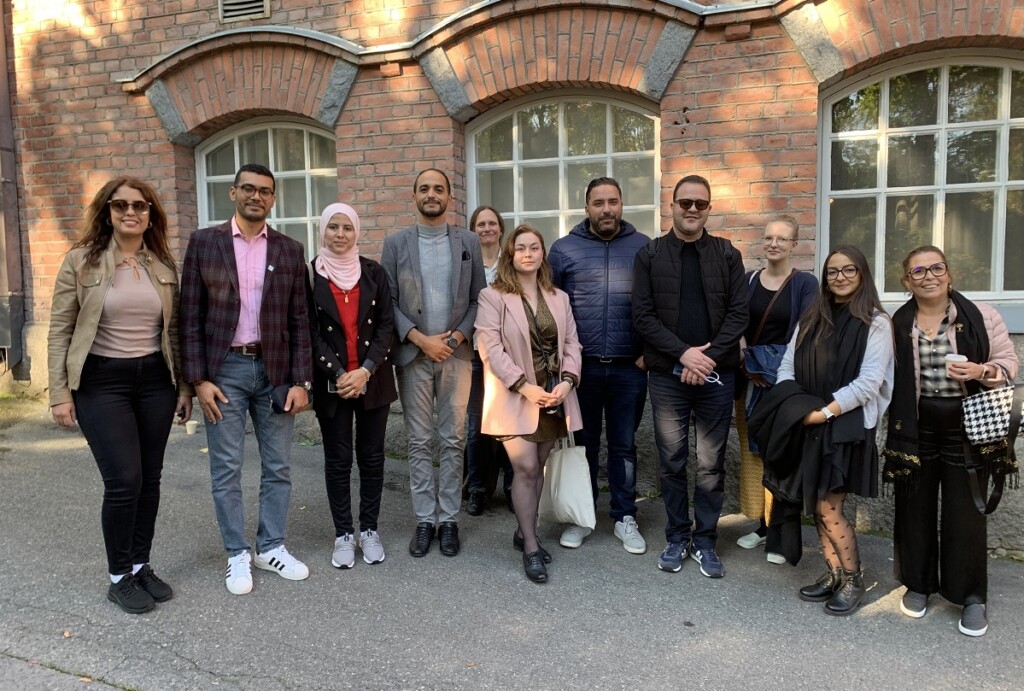
Determination to develop democracy
The participants showed their will to learn new things and understand the functioning of Finnish society during the study visit. Detailed questions and active discussion in many meetings showed that the group had clear learning goals. As alumni of the Tunisian School of Politics, the participants had already completed the first two year-long training cycles of the TSoP, so they already had a strong theoretical understanding of democratic governance. Most of the participants represented political parties, and the group also had experience in media, public administration and trade unions, among other things. They are currently studying in the TSoP training of trainers, which allows them to share their knowledge more widely in their respective political parties and other background organisations.
During the study visit, the participants saw how democratic thinking and active citizenship can permeate the entire society and be part of what even young children learn in schools. There is for sure work to be done in Finland in terms of strengthening the citizens’ experience of inclusion and participation, but in a young democracy the work is only at the beginning.
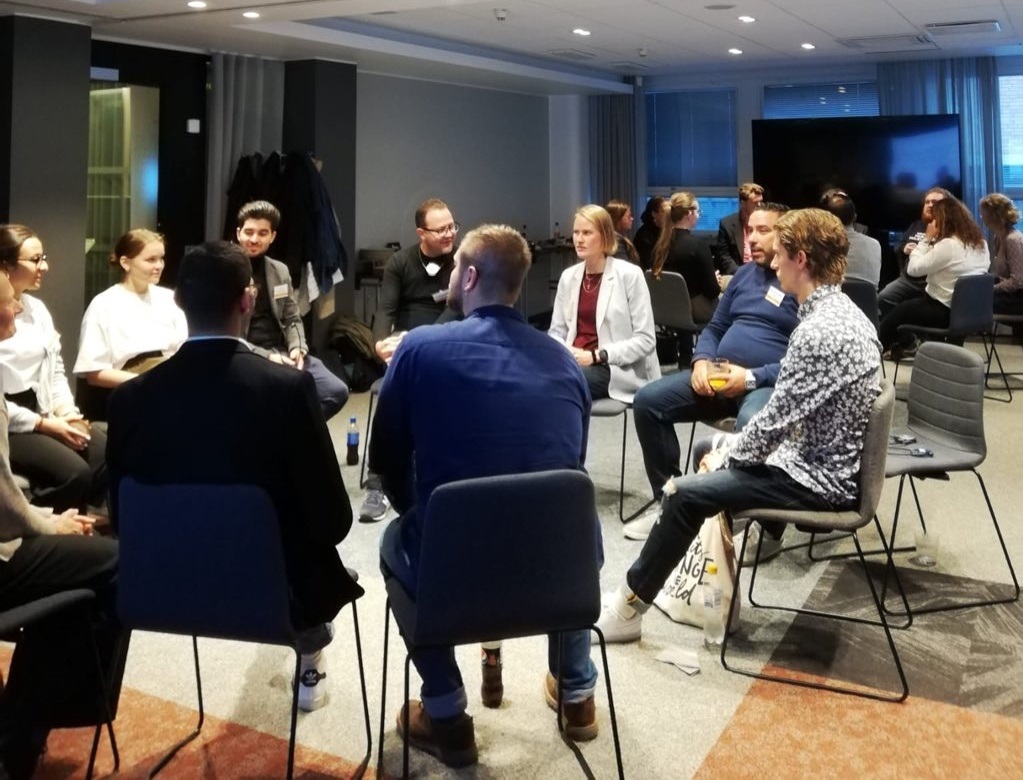
”In the TSoP trainings we have promoted democratic governance, but in visits to Finland or other countries like Finland the participants see a concrete example of what democracy and involving youth in politics look like”, says Hanen Kalai, Programme Manager of CEMI. “They were impressed by the results of years and years of democratic process here in Finland.”
It was also encouraging for the guests to hear that not everything has always been successful in Finland either – the brutal civil war shortly after the country’s independence was a stark example of this. On the other hand, the guests were interested in the fact that after the war it was possible for those who belonged to the losing side to return to Parliament and that parliamentarism united the different sides of the war. Examples of the strengths of democracy but also of the steps back and how difficulties have been solved are important.
Although the political situation in Tunisia is challenging, the TSoP alumni continue to work for the development of society. A group of determined young people returned from the study visit with new inspiration and ideas for strengthening youth participation, transparency of society and democratic thinking. The Tunisian School of Politics has played a significant role in strengthening dialogue between political actors, as it brings together young people from different political parties and civil society. The result is new networks, more co-operation and friendships across political party lines, which are necessary for democratic and inclusive decision-making to thrive.
